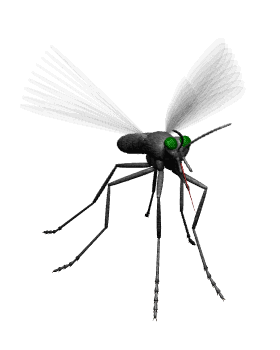Feel Like a Mosquito Magnet?
Ever wonder why you seem to be on the menu at backyard barbecues? Truth is - mosquitoes are not equal opportunity biters. Here's why mosquitoes seem to target certain people more than others:
-
Mosquitoes can smell human breath. They have receptors on their antennae that detect the carbon dioxide released when we exhale. Those plumes of CO2 rise into the air, acting as trails that the mosquitoes follow to find the source.
-
Sweat helps mosquitoes choose their victims. Our skin produces more than 340 chemical odors, and some of them smell like dinner to mosquitoes. They are fond of octenol, a chemical released in sweat, as well as cholesterol, folic acid, certain bacteria, skin lotions, and perfume.
-
Body heat marks the target. Mosquitoes use heat sensors around their mouthparts to detect the warmth of your body – actually, the blood inside it – then land on you and locate the best capillaries for tapping.
-
Dark clothing attracts mosquitoes. Remember, they are drawn to heat and darker clothes retain more heat than light-colored clothing.
-
Pregnant women attract more mosquitoes. Studies show that pregnant women attract twice as many mosquitoes as non-pregnant women. This is because pregnant woman exhale more carbon dioxide, have higher body temperatures, and have more blood circulating through their bodies than the average person.
-
Drinking alcohol makes your skin give off a chemical that attracts mosquitoes. Alcohol also increases body temperature, which is another huge mosquito attractor.
The Buzzz on Mosquitoes
Almost everyone's had the unpleasant experience of being bitten by a mosquito. Beyond the nuisance factor, mosquitoes are carriers, or vectors, of viruses and diseases transmissible to humans, livestock and pets. Mosquito-borne diseases cause millions of deaths worldwide every year.
Here's the buzzz on what the U.S. Centers for Disease Control considers "one of the most dangerous creatures on the planet" because of their ability to spread deadly diseases:
-
There are more than 3,500 species of mosquitoes. About 200 of them are found in the United States.
-
Only female mosquitoes bite people. Both male and female feed mainly on fruit and plant nectar, but the female also needs the protein in blood to help her eggs develop.
-
Mosquitoes don't have teeth. The females “bite” with a long, pointed mouthpart called a proboscis. They use the serrated proboscis to pierce the skin and locate a capillary, then draw blood through one of two tubes.
-
The bumps from mosquito bites are caused by saliva. While one tube in the proboscis draws blood, a second pumps in saliva containing a mild painkiller and an anti-coagulant. Most people have minor allergic reactions to the saliva, causing the area around the bite to swell and itch.
-
A mosquito can drink up to three times its weight in blood. Don't worry, though - it would take about 1.2 million bites to drain all the blood from your body.
-
Female mosquitoes can lay up to 300 eggs at a time. Usually, the eggs are deposited in clusters – called rafts – on the surface of stagnant water, or they are laid in areas that flood regularly. Eggs can hatch in as little as an inch of standing water. Females will lay eggs up to three times before they die.
-
Mosquitoes spend their first 10 days in water. Water is necessary for the eggs to hatch into larvae, called wigglers. Wigglers feed on organic matter in stagnant water and breathe oxygen from the surface. They develop into pupae, which do not feed and are partially encased in cocoons. Over several days, the pupae change into adult mosquitoes.
-
Mosquitoes hibernate. They are cold-blooded and prefer temperatures over 80 degrees. At temperatures less than 50 degrees, they shut down for the winter. The adult females of some species find holes where they wait for warmer weather, while others lay their eggs in freezing water and die. The eggs keep until the temperatures rise, and they can hatch.
-
The average mosquito lifespan is less than two months. Males have the shortest lives, usually 10 days or less, and females can live about six to eight weeks, under ideal conditions. The females lay eggs about every three days during that time.
-
Mosquitoes can't fly very far or very fast. Most mosquitoes can fly no more than about one to three miles, and often stay within several hundred feet of where they were hatched. The top speed for a mosquito is about 1.5 miles per hour.



